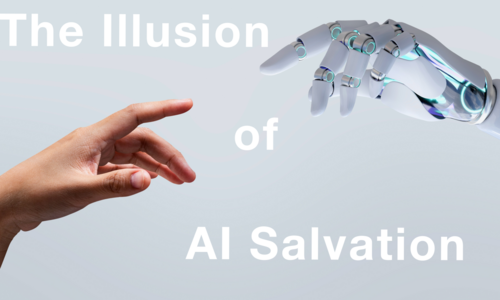
The Illusion of AI Salvation
AI Is Not Your Savior — It’s a Mirror
In almost every leadership meeting today, someone brings up artificial intelligence. It promises faster processes, smarter decisions, and new levels of efficiency. The language around it sounds almost religious: “AI will transform everything.” “It will solve our biggest problems.”
But step back and think carefully — when did technology ever solve a moral problem? When did a new tool ever make people more trustworthy, courageous, or compassionate?
The deeper truth is this: AI doesn’t fix broken systems; it amplifies them. It reveals what’s already inside your company — the good, the bad, and the unspoken.
If your leadership culture is humble, mission-driven, and people-centered, AI can multiply your effectiveness. It can streamline processes and free people to focus on creative, relational, and strategic work. But if your culture is rooted in fear, ego, or short-term gain, AI will make those problems worse. It will help you fail faster and more efficiently.
This is why it’s dangerous to see AI as a savior. It’s not salvation — it’s reflection. It mirrors your leadership DNA.
“Unless the Lord builds the house, the builders labor in vain.” — Psalm 127:1
This verse isn’t just for faith communities; it speaks directly to leadership. Without a moral foundation — without something greater than human ambition — the work we do eventually collapses under its own weight. AI might be powerful, but it’s still a tool. It cannot set direction, define purpose, or heal division.
Think about what’s really broken in most organizations:
- A lack of trust between teams.
- Confusion about purpose.
- Compromised integrity in decision-making.
- Burnout, disengagement, and fear of change.
These are not problems of intelligence; they are problems of wisdom. And wisdom cannot be programmed.
The Book of Proverbs says,
“For the Lord gives wisdom; from His mouth come knowledge and understanding.” — Proverbs 2:6
AI gives data, but not wisdom. It offers insight, but not understanding. You can automate systems, but you can’t automate sincerity. You can train models, but you can’t train morality.
Leaders who put their hope in AI to “save” their company are asking the wrong question. The question isn’t “What can AI do for us?” It’s “Who are we becoming as we use it?”
Every new technology in history has challenged humanity to look inward. The printing press spread truth — and lies. The internet connected — and divided — us. AI will be no different. It will amplify whatever values we embed in it.
If your company values transparency, AI can help communicate better.
If your company values manipulation, AI will help you do that too — just faster.
This is why leadership grounded in moral clarity is more important than ever. We don’t need smarter tools; we need wiser leaders. Leaders who know when to say “yes,” when to say “no,” and when to stop and seek understanding.
True leadership requires courage — the courage to admit that some problems can’t be solved by technology. They can only be solved by transformation: of hearts, of culture, and of purpose.
When AI becomes just another idol for performance, we lose sight of what business is truly about: people. People who create, serve, risk, grow, and dream. People who, at their best, reflect something sacred — not synthetic.
So let AI do what it’s good at. Let it crunch the numbers, analyze the patterns, and handle the tasks. But don’t let it define your values or replace your vision.
Because in the end, AI is not your savior. It’s your mirror. It will show you who you are as a leader and as an organization.
And if you don’t like what you see — no algorithm can fix that. But wisdom can.
“Wisdom is more precious than rubies; nothing you desire can compare with her.” — Proverbs 3:15
Comments
No Comments





